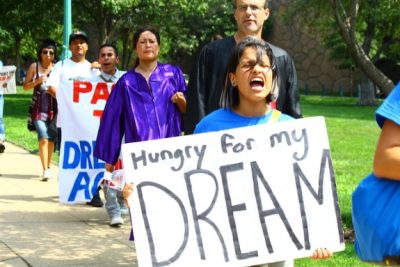Integration

New Report Predicts Continuing Integration of Immigrants into U.S. Society
Anti-immigrant activists like to pretend that immigrants are destined to be poor and to never successfully integrate into U.S. society. However, a new report from the Center for American Progress (CAP) concludes that, in reality, “immigrants are integrating into American life, learning English, and becoming homeowners.” When socioeconomic advancement is tracked over time, it becomes clear that “far from a life in poverty, immigrants are exemplifying the American Dream.” The report, entitled Assimilation Tomorrow, was co-authored by renowned demographer Dowell Myers (a professor in the School of Policy, Planning, and Development at the University of Southern California) and by John Pitkin (president of Analysis and Forecasting, Inc., in Cambridge, Massachusetts). This report is the companion piece to another study which was released by CAP last year, entitled Assimilation Today. Read More

Non-Citizens Eager to Serve in U.S. Military Blocked by Government Bureaucracy
BY MARGARET D. STOCK, COUNSEL TO THE FIRM, LANE POWELL PC This Veterans Day, we celebrate those who have proudly served in the U.S. military, including immigrants. Immigrants have long served in all branches of the U.S. military as infantry soldiers, medics, foreign-language translators, and in every other job open to them. At last count, foreign-born service members made up about 8% of the 1.4 million military personnel on active duty. However, some highly qualified non-citizens have been blocked from serving due to the Obama Administration’s suspension of a recruiting program called the Military Accessions Vital to the National Interest (MAVNI). Frustrated by the government bureaucracy responsible for halting MAVNI, those non-citizen volunteers are petitioning the government in hopes of reopening the program. Read More

Dayton, Ohio Passes Plan to Revitalize Economy through Immigrant Integration
Shortly after Alabama began implementing their anti-immigration law (HB 56), Dayton, Ohio passed legislation that welcomes and integrates immigrants with the hope that they will revitalize their slowing economy. Faced with a declining population, Dayton’s City Commission voted unanimously last week to adopt the Welcome Dayton Plan—a plan that is tapping into the very economic stimulus that Alabama is driving out. Read More

Better Immigrant Integration Leads to Economic Growth
Over the weekend, more than 27,000 people became American citizens during 285 naturalization ceremonies held across the country in honor of Citizenship Day (September 17). Becoming a citizen, however, is hard work. A new country, new rules, high costs, and little targeted support for new immigrants make what should be a journey of exploration and opportunity one that may be frustrating and lonely. Not surprisingly, problems such as these are a major obstacle to naturalization. Scholars note that despite the steady rise in naturalization rates over the decades, a shocking number of people do not naturalize are actually eligible to do so. In 2008, for example, while more than one million LPRs naturalized, more than eight million were eligible to do so. Developing better integration programs, however, may improve naturalization efforts and lead to economic growth. Read More

Improving the Naturalization Process: Better Immigrant Integration Leads to Economic Growth
Anyone who has ever attended a naturalization ceremony cannot help but be moved by the power of the moment. The participants enter as men, women, and children of diverse countries, but leave the room as citizens of one—the United States. For many, the path to that naturalization ceremony has been long and arduous, irrespective of whether they entered the United States as wealthy entrepreneurs or as refugees with nothing but the clothes on their backs. The process of obtaining lawful permanent resident (LPR) status, and ultimately U.S. citizenship, is often daunting. A new country, new rules, high costs, and little targeted support for new immigrants makes what should be a journey of exploration and opportunity one that may be frustrating and lonely. Consequently, in order to focus on ways to improve the naturalization process itself, we must take a step back and consider the nature of immigrant integration in the United States. The better our integration policies—and the sooner they begin—the more likely we are to improve the rate of naturalization. Read More

California Passes Other Half of DREAM Act Package
While many applauded Governor Jerry Brown’s recent efforts to make college more affordable for all of California’s students, others insisted the state didn’t go far enough. Back in July, Gov. Brown signed AB 130—a bill that allows undocumented students enrolled in California’s public colleges and universities to receive privately-funded university scholarships from non-state funds. At the time, however, its companion bill, AB 131—which would allow undocumented students to apply for state-sponsored financial aid—was stuck in California’s Senate Appropriations Committee. Last week, despite opposition from immigration restrictionists, both California’s State Assembly and Senate approved AB 131 which is now on its way to Gov. Brown’s desk. Many predict Gov. Brown will sign the measure based on promises he made during his campaign. Read More

What the New Budget Law Could Mean for Immigrant and Refugee Programs
BY ERIC SIGMON, LUTHERAN IMMIGRATION AND REFUGEE SERVICE* On August 2, after a number of press conferences and late-night negotiation sessions, President Obama signed into law the Budget Control of Act of 2011, legislation that prevented the U.S. government from defaulting on its debt and requires deep cuts into future federal spending. While deficit cutting laws may not sound very interesting to the average reader, this new law will decrease the size and role of the federal government over the next decade. Over the next four months, Congress will have to make decisions that will shape the government’s capacity to provide protection and life-saving assistance to refugees, adjudicate immigration benefits, and enforce U.S. immigration laws along the border and in the interior (apprehensions, detentions, deportations). Read More

What’s the Value of Keeping Undocumented Youth in the Shadows?
The real life psychological ramifications of young immigrants struggling with their unauthorized status are often glossed over in the larger immigration debate. In a recent journal article, Learning to Be Illegal: Undocumented Youth and Shifting Legal Contexts in the Transition to Adulthood, University of Chicago professor Roberto G. Gonzales uses 150 interviews with young Latino adults to examine how unauthorized youth deal with their legal status as they come of age. Gonzales finds that as unauthorized immigrant children transition into adulthood, many “learn to be illegal,” figuring out how to exist in a society that was once welcoming, but now prohibits their participation. Read More

Immigration Group Honors Winner of National 5th Grade Writing Contest
Tonight, the American Immigration Council will honor Maya Young Wong, the winner of the 14th Annual “Celebrate America” Creative Writing Contest, at the 2011 American Heritage Awards in San Diego. Maya Young Wong of California will read her winning poem, “My Grandfather Ben,” which was selected out of more than 6,500 entries by a host of celebrity judges, including Olympic Gold Medalist in wrestling, Henry Cejudo; the President of the America Federation for Teachers, Randi Weingarten; Presidential Medal of Freedom recipient and Holocaust survior, Gerda Weissman Klein; and President pro tem Senator Dan Inouye of Hawaii. Read More

More Immigrants are Educated, Skilled Than Ever Before, Report Finds
A new report released by the Brookings Institution dispels the myth that all immigrants are unskilled, uneducated, and illegal. The report, entitled The Geography of Immigrant Skills: Educational Profiles of Metropolitan Areas, finds that the share of working-age immigrants in the United States who have at least a bachelor’s degree is greater than the share who lack a high-school diploma. Moreover, immigrants with college degrees outnumber immigrants without high-school diplomas by wide margins in more than two-fifths of the nation’s 100 largest metropolitan areas. Read More
Make a contribution
Make a direct impact on the lives of immigrants.
